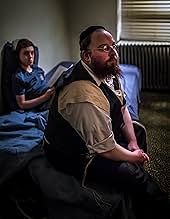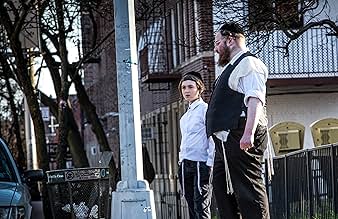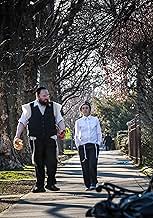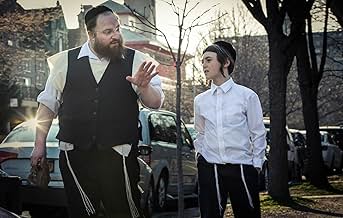IMDb RATING
6.6/10
2.7K
YOUR RATING
Within Brooklyn's ultra-orthodox Jewish community, a widower battles for custody of his son. A tender drama performed entirely in Yiddish, the film intimately explores the nature of faith an... Read allWithin Brooklyn's ultra-orthodox Jewish community, a widower battles for custody of his son. A tender drama performed entirely in Yiddish, the film intimately explores the nature of faith and the price of parenthood.Within Brooklyn's ultra-orthodox Jewish community, a widower battles for custody of his son. A tender drama performed entirely in Yiddish, the film intimately explores the nature of faith and the price of parenthood.
- Awards
- 7 wins & 18 nominations total
Meir Ber Schwartz
- The Ruv
- (as Meyer Schwartz)
Melissa Weisz
- Bayla
- (voice)
Featured reviews
Really like the film.
I'm hoping that I got a pretty actuate perceptive on the Hasidic Jewish community. I'm aware of some aspects about how women are treated as a whole, which for me, made it more interesting that the movie tells a story about a widowed father trying to raise his son in a society that says he can't do it.You don't see that enough in movies in general. A man doing what he has to to be a man in order to raise his child alone, and I'm seeing it in the most rarest prospective.
It reminds me of Moonlight, it's not really a story I've never herd before but nobody tells the story from this unique angel.
Brilliant! http://cinemagardens.com
I'm hoping that I got a pretty actuate perceptive on the Hasidic Jewish community. I'm aware of some aspects about how women are treated as a whole, which for me, made it more interesting that the movie tells a story about a widowed father trying to raise his son in a society that says he can't do it.You don't see that enough in movies in general. A man doing what he has to to be a man in order to raise his child alone, and I'm seeing it in the most rarest prospective.
It reminds me of Moonlight, it's not really a story I've never herd before but nobody tells the story from this unique angel.
Brilliant! http://cinemagardens.com
This movie causes tremendous anguish, okay Menashe can't be considered what we usually call a responsible adult, but the rules on fatherhood revolted me extremely, it hurt, to see the love for the child and the mandatory absence (no father and mother a child can't study) absurd... Slow, delicate, simple, a pure portrait of father/son love and Jewish traditions. Menashe's plot is loosely based on Lustig's life. In an interview with the Los Angeles Times, he said that "unlike Menashe in the movie, I'm not a schlimazel by nature. Maybe just a schlimazel by situation."
"Menashe" is a semi-documentary, reflecting the case of Menashe Lustig, the actor performed the main character. A film about laws of an ultra conservative community, about parenthood and about life. And , sure, about vulnerable people. Touching and delicate and precise, the work of Menashe Lustig is just admirable. He is the film and I admitt, I saw me reflected in his beautiful portrait of the single father , lost across the challenges, naive and man of good intentions, prisoner of his life. So, a gem . A real special one because it is not a lesson but a confession, honest at whole.
The Hasidic tradition that a child must be raised in a household where there is both a mother and a father is one of the cultural issues brought to the fore in Joshua Weinstein's bittersweet film Menashe. Co-written by Alex Lipschutz and Musa Syeed ("A Stray") and set in the Hasidic community in the Borough Park section of Brooklyn using all non-professional actors, Menashe is an engaging character study that provides rare insight into a society largely hidden from the outside world and a father's endearing love for his son and the challenges he faces strike a universal chord.
Spoken almost entirely in Yiddish, Menashe (Menashe Lustig) is a widower who wants to live his own life and raise his young son Rieven (Ruben Niborski) by himself. Unfortunately, the ultra-Orthodox community of which he is a part does not see it that way. In his opposition to Hasidic cultural norms, he risks his son's expulsion from school and jeopardizes his status in the community. Menashe wants to do right by his son, but the Talmud says that a man needs three things: a nice wife, a house and dishes (presumably no paper plates). Without a wife Menashe has to allow Rieven's gruff and super critical uncle Eizik (Yoel Weisshaus) to raise the boy. The burly, sloppy-looking Menashe fancies himself as a rebel, refusing to wear a hat and jacket required by Hasidic custom, but he is a rebel without a cause.
Weinstein, however, does not stand in judgment of his main character and tells his story in a straightforward, if not entirely sympathetic manner, but it is a hard sell. Menashe's job stocking shelves at a local market is barely enough to make a living and his ineptness draws the ire of his boss when one thousand dollars worth of gefilte fish falls out of the van he is driving. In addition, the small unkempt one-room apartment is a dubious environment to raise a child. Menashe feeds his son junk food and sodas for breakfast, but the boy, though critical of the way he treated his mother, still loves him.
The stakes are high but Menashe refuses to remarry, telling friends that his previous arranged marriage with an Israeli woman was filled with constant conflict and unhappiness and tells a beggar to avoid marriage because "it's better for your health." He goes on a date with a widowed mother with children who is not reticent about telling him what a fine husband he would make. When Menashe shows his reluctance to enter into a marriage of convenience, however, she condemns Hasidic men, saying that "First your mothers spoil you, then your wives." Menashe appeals to the rabbi (Meyer Schwartz) but he is unyielding. Eventually he takes pity and offers a compromise: Rieven can stay with Menashe for one month, but if he hasn't remarried after the anniversary of his mother's death, the boy must return to Eizik.
Desperate to prove himself to be a worthy father, Menashe asks the rabbi if he can host a memorial for his deceased wife in his small apartment. Reluctantly all agree that "even a bear can learn to dance." Menashe raises complex issues about the conflict between social acceptance, religious dogma, and human needs and desires. Unfortunately, the film's running time of eighty-two minutes seems inadequate to explore the complex issues the film raises. Weinstein, however, does not want to go there. He said, "I was interested more in the non-plot elements than the plot of the film. It was about the texture, the anecdotes, faces, moments." These poignant faces and moments are what we cannot forget.
Spoken almost entirely in Yiddish, Menashe (Menashe Lustig) is a widower who wants to live his own life and raise his young son Rieven (Ruben Niborski) by himself. Unfortunately, the ultra-Orthodox community of which he is a part does not see it that way. In his opposition to Hasidic cultural norms, he risks his son's expulsion from school and jeopardizes his status in the community. Menashe wants to do right by his son, but the Talmud says that a man needs three things: a nice wife, a house and dishes (presumably no paper plates). Without a wife Menashe has to allow Rieven's gruff and super critical uncle Eizik (Yoel Weisshaus) to raise the boy. The burly, sloppy-looking Menashe fancies himself as a rebel, refusing to wear a hat and jacket required by Hasidic custom, but he is a rebel without a cause.
Weinstein, however, does not stand in judgment of his main character and tells his story in a straightforward, if not entirely sympathetic manner, but it is a hard sell. Menashe's job stocking shelves at a local market is barely enough to make a living and his ineptness draws the ire of his boss when one thousand dollars worth of gefilte fish falls out of the van he is driving. In addition, the small unkempt one-room apartment is a dubious environment to raise a child. Menashe feeds his son junk food and sodas for breakfast, but the boy, though critical of the way he treated his mother, still loves him.
The stakes are high but Menashe refuses to remarry, telling friends that his previous arranged marriage with an Israeli woman was filled with constant conflict and unhappiness and tells a beggar to avoid marriage because "it's better for your health." He goes on a date with a widowed mother with children who is not reticent about telling him what a fine husband he would make. When Menashe shows his reluctance to enter into a marriage of convenience, however, she condemns Hasidic men, saying that "First your mothers spoil you, then your wives." Menashe appeals to the rabbi (Meyer Schwartz) but he is unyielding. Eventually he takes pity and offers a compromise: Rieven can stay with Menashe for one month, but if he hasn't remarried after the anniversary of his mother's death, the boy must return to Eizik.
Desperate to prove himself to be a worthy father, Menashe asks the rabbi if he can host a memorial for his deceased wife in his small apartment. Reluctantly all agree that "even a bear can learn to dance." Menashe raises complex issues about the conflict between social acceptance, religious dogma, and human needs and desires. Unfortunately, the film's running time of eighty-two minutes seems inadequate to explore the complex issues the film raises. Weinstein, however, does not want to go there. He said, "I was interested more in the non-plot elements than the plot of the film. It was about the texture, the anecdotes, faces, moments." These poignant faces and moments are what we cannot forget.
This quiet drama portrays the scuffling life of a man within the Hasidic community in Brooklyn as he endeavors to regain custody of his son in the aftermath of his wife's passing. He is expected to find a new wife and achieve stability as he holds down a low-paying, labor-intensive job as a grocery clerk that drains him of his time and his spirit. He has difficulty keeping his own modest life in order, let alone being strong enough to provide for another human being.
His efforts to better himself in order to regain custody of his son are met with dismissal from those around him, including his more devout and financially stable brother-in-law whom the community has decided should look after the man's son. He gets little encouragement from those within his community, yet he persists.
There is a considerable schism within the Hasidic community that comes to light in this film, especially on account of the man's less-than-pious lifestyle and more secular demeanor. He doesn't readily embrace the hard-line teachings of his sect as forcefully as his peers, but he nevertheless wants what's best for his son and wants to fulfill the requirements of his denomination in order to remain a real father. In that regard, this is an exceptional portrayal of loyalty to one's religious faith in the face of ongoing personal conflict. It's definitely not for many viewers who wouldn't relate to religious doctrine as a deciding force in one's life, but it's still a story that's effectively conveyed and devoid of proselytizing. Recommended to open-minded viewers.
His efforts to better himself in order to regain custody of his son are met with dismissal from those around him, including his more devout and financially stable brother-in-law whom the community has decided should look after the man's son. He gets little encouragement from those within his community, yet he persists.
There is a considerable schism within the Hasidic community that comes to light in this film, especially on account of the man's less-than-pious lifestyle and more secular demeanor. He doesn't readily embrace the hard-line teachings of his sect as forcefully as his peers, but he nevertheless wants what's best for his son and wants to fulfill the requirements of his denomination in order to remain a real father. In that regard, this is an exceptional portrayal of loyalty to one's religious faith in the face of ongoing personal conflict. It's definitely not for many viewers who wouldn't relate to religious doctrine as a deciding force in one's life, but it's still a story that's effectively conveyed and devoid of proselytizing. Recommended to open-minded viewers.
Did you know
- TriviaDirector Joshua Z Weinstein, who is neither a member of a Haredi community nor a speaker of Yiddish, used a translator on set.
- SoundtracksIvdu Es Hashem Mit Simcha
Written and performed by Michoel Schnitzler
Courtesy of Michoel Schnitzler
- How long is Menashe?Powered by Alexa
Details
- Release date
- Countries of origin
- Official site
- Languages
- Also known as
- Menashe
- Filming locations
- Production companies
- See more company credits at IMDbPro
Box office
- Gross US & Canada
- $1,703,036
- Opening weekend US & Canada
- $62,078
- Jul 30, 2017
- Gross worldwide
- $1,962,265
- Runtime
- 1h 22m(82 min)
- Color
- Sound mix
- Aspect ratio
- 2.00 : 1
Contribute to this page
Suggest an edit or add missing content











